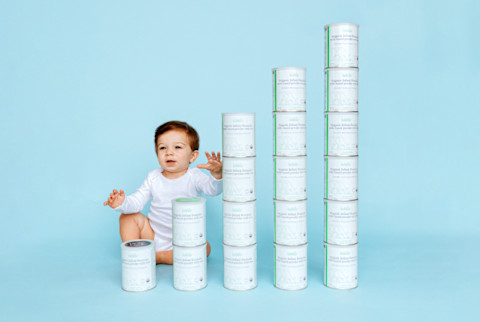How This Brand's European-Style Infant Formula Earned Them A 7,000-Person Waitlist

If you've walked by the Apple Store during the week of a new iPhone release, you've surely witnessed the line that wraps around the block with eager shoppers waiting to snag their upgrade. This is the kind of product hype we're used to. But what no one could have expected was the mega-waitlist that accumulated for an infant formula brand that launched in the U.S. earlier this year.
Bobbie hit the market in January of 2021, and by March, there were over 7,000 people on a waitlist for the subscription-based formula brand. In less than 10 months, it was being used by babies in all 50 states, gaining the support of big names like Lauren Dern, Gwyneth Paltrow, and Tan France. So what is it about Bobbie that attracted so much attention? For starters, the sleek, millennial-esque brand is the first European-style infant formula to become available in the United States. But it's so much more than that.
A goal to support parents and nourish babies.
Parents choose to feed their babies formula for a variety of reasons: work demands, low breast milk production, breast cancer surgeries, maternal mental health issues1, and situations where the birth mother isn't involved (same-sex couples, adoption, surrogacy, etc.). In fact, a survey conducted by Wakefield Research in 2019 found that 83% of parents in the U.S. will turn to formula in their child's first year of life. And yet, the stigma associated with formula feeding is still there, taking a toll on the mental health of mothers2 who choose to wean.
Many parents also struggle to find U.S. formulas that they feel comfortable feeding their babies. These two reasons are ultimately what inspired fellow moms and former Silicon Valley co-workers Laura Modi and Sarah Hardy to develop a European-style baby formula manufactured here in the US, inspired by modern parenting.
What's different about European-style infant formula?
Some parents believe that the European Commission, or E.C. (European equivalent of the U.S. FDA) is more up-to-date with nutrition science and has more stringent requirements than the U.S. FDA. Parents also believe that infant formula made in Europe has more desirable ingredients than the U.S. offerings and are known to be well tolerated by infants. For example, all infant formula in Europe is required to be organic. But the problem is, European formulas are not FDA regulated and are only available in the U.S. through third-party distributors—aka the black market. Acquiring formulas through these means is unsafe and illegal.
This is one of the reasons Bobbie Infant Formula quickly became a hot-ticket item. Bobbie offers a solution for U.S. parents searching for E.U. products, without the risks associated with illegal importation. Bobbie is safe, U.S.-manufactured (in Vermont), and available by subscription while meeting USDA Organic, Kosher, and FDA quality standards.
All the ingredients babies need and none of the ones they don't.
As hypervigilant as we are about the ingredients we put into our bodies, we shouldn't have to change our standards when it comes to our babies. To learn more about the ingredients found in Bobbie's European-inspired formula, we spoke with board-certified pediatrician and Bobbie medical adviser Jacqueline Winkelmann, M.D., FAAP. When asked what makes Bobbie's recipe so unique, Winkelmann narrowed it down to five main things:
- Modeled after breastmilk. Bobbie chooses to use 100% lactose as its carbohydrate source, which is the primary carbohydrate found in breastmilk.
- Easy for babies to digest. Bobbie's protein ratio is also similar to that of mature breast milk, with a 60:40 whey:casein ratio, making it easier for babies to digest.
- The omission of less desirable ingredients. Bobbie leaves out other carbohydrate sources like corn syrup, cane sugar, and maltodextrin. These sugars are used by other formula companies because they are inexpensive to manufacture and easy to digest, but they have a higher "glycemic index," which leads to a higher insulin spike. Bobbie also leaves out palm oil as a fat source, which may lead to constipation3 in some young babies.
- Its high DHA content. Bobbie's DHA content (an essential omega-3 fatty acid) meets E.U. infant formula standards, the only U.S. infant formula to do so. Adequate levels of DHA in infant formula have been shown to support neurodevelopment and eye health4.
- USDA organic certification. As of today, Bobbie offers the ONLY infant formula in the U.S. derived from organic, pasture-raised dairy. Organic certification is time-consuming and expensive but offers peace of mind to those parents that worry about levels of pesticides or environmental sustainability.
A brand parents can get behind.
Bobbie is filling a gap in the infant formula market and at the same time creating a culture that resonates with parents—millennial parents, in particular. Millennials look to support companies that sell quality products and make a meaningful impact on the world. Bobbie's campaign surrounding insurance gaps for mastectomy survivors, as well as the launch of Milk Drunk—their inclusive, feeding support site for new parents—is what makes them stand out among other formula companies, turning thousands of "fans" into excited customers.
The level of passion and expertise behind Bobbie is simply unparalleled, with a female-founded team of scientists, regulatory experts, marketers, and innovators who used their own feeding experiences to create a better option for health-conscious U.S. parents. When moms with a purpose joined together, the result was a brand so great that it led to a 7,000-person feeding frenzy—literally.

